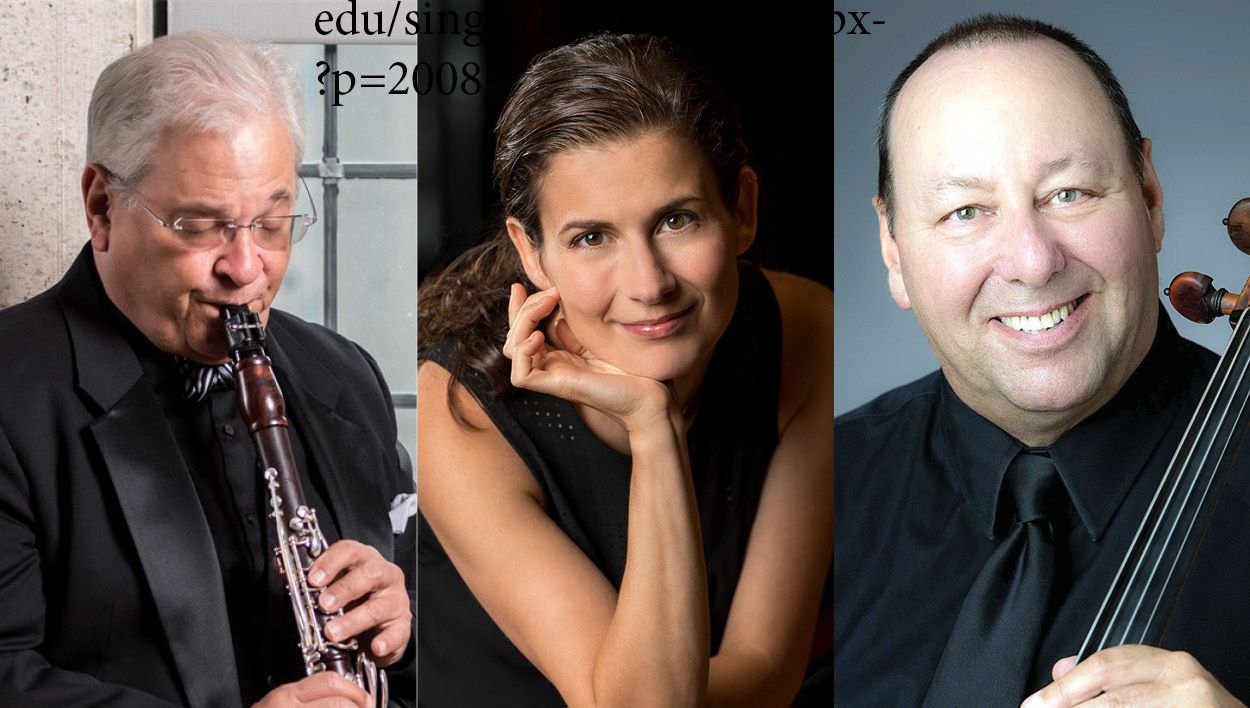
Yale School Of Music
Three musicians — pianist Anna Polonsky, clarinetist David Shifrin and cellist Peter Wiley — sat on Sprague Hall’s stage. In the moments before they began to play, Wiley raised an eyebrow and grinned, Shifrin chuckled and Polonsky smiled. Then, Wiley drew his bow across the string to begin the opening cello line of Ludwig van Beethoven’s “Piano Trio Op. 11, No. 4” also known as “Gassenhauer.”
The Polonsky-Shifrin-Wiley trio’s performance was the third concert in the School of Music’s Oneppo Chamber Music series, and took place on Tuesday, Nov. 12. The concert’s program included works by Nino Rota and Francis Poulenc and concluded with Brahms’s Op. 114 clarinet trio. Shifrin, School of Music clarinet professor and artistic director of the Oneppo Series, founded the Polonsky-Shifrin-Wiley trio, which connects three decorated musicians with storied and diverse careers.
“When forming this group, we were looking for projects that would be meaningful musically, and this seemed really natural,” Shifrin said. “I am happy to have the chance to bring this group to Yale.”
The 2019–20 school year marks the trio’s inaugural season, and the group has already given concerts in several states.
“Peter and I have known each other for more than half a century as friends and colleagues,” Shifrin said. “We’ve played together in so many places on so many occasions.”
Shifrin and Wiley met at ages 18 and 13, respectively, when they were students at the Curtis Institute of Music. Since then, Shifrin has won the Avery Fisher Prize, appeared with major orchestras — including the Philadelphia and Minnesota orchestras — and has been nominated for three Grammy awards. In addition to his roles at Yale, he has served as the artistic director of Chamber Music Northwest and the artistic director of the Chamber Music Society of Lincoln Center.
Wiley served as the cellist for two world-renowned chamber music groups: the Beaux Arts Trio and the Guarneri Quartet. He was appointed principal cellist of the Cincinnati Symphony at age 20. Wiley is currently on the faculty of the Curtis Institute and Bard College Conservatory of Music.
Russian-born pianist Polonsky moved to the United States in 1990 and received her education at the Curtis Institute of Music, the Juilliard School and the Interlochen Arts Academy. She has appeared as a soloist with the Moscow Virtuosi, the Buffalo Philharmonic and the Saint Paul Chamber Orchestra. She has collaborated with the Guarneri, Orion, Daedalus and Shanghai Quartets and with other prominent musicians including Mitsuko Uchida, Yo-Yo Ma, Emanuel Ax and Jaime Laredo.
“Peter and I were unanimous in choosing Anna as the third member,” Shifrin said. “There’s a really wonderful repertoire for this combination of instruments.”
Wiley met Polonsky at the Marlboro Music Festival, an artist program devoted to intense study of chamber music. All three played music together at Chamber Music Northwest, Shifrin’s festival.
For audience member Richard Petrelli ’65 SPH ’68, the trio’s performance of the Beethoven “was a highlight of the concert.”
“That Beethoven trio is a unique Beethoven trio,” Petrelli said. “It’s a little different because it’s lighter than typical Beethoven, and they did a very fine performance of complementing one another, carrying the tunes from the clarinet to the piano to the cello.”
The Beethoven trio’s nickname, “Gassenhauer,” comes from a late, 19th-century comic opera by Joseph Weigl. Beethoven used an aria from the opera “Pria ch’io l’impegno” — which translates to “Before I take on this task, I wish to have a snack” — as the theme for his trio’s final theme-and-variations movement.
After the Beethoven, the trio performed the music of Nino Rota, a 20th-century Italian composer known for the film scores of “The Godfather” and Franco Zeffirelli’s “Romeo and Juliet.” In addition to writing for film, Rota wrote 11 operas and over 20 chamber works.
“He’s a marvelous composer, and everybody knows his music whether they know [him] or not,” Shifrin said. “We’ve exhausted all the puns with that, like how he Rota trio.”
Petrelli said he would like to hear more of Rota’s music.
The Poulenc trio that followed was originally written for piano, oboe and bassoon. The piece combines influences from the German classical period and Poulenc’s French background.
Audience members and clarinetists Jalen Li ’23 and Joshua Rothbaum ’23 praised the ensemble’s technical and rhythmic prowess.
“The level of communication they had was unrivaled,” Li said. “They would all keep turning to each other, and everything felt like it was locking into place.”
The Brahms clarinet trio that concluded the program was one of Brahms’s last works. In the summer of 1890, Brahms declared that he would stop composing. Upon meeting clarinetist Richard Mühlfeld, Brahms was reinspired to compose chamber music for the clarinet. His final set of works include the tender and romantic trio that the ensemble performed.
The three members of the trio hope to devote a few weeks each year to touring. They aim to further explore existing repertoire and commission new works.
“We have pretty diverse careers and lives, so we can’t devote our full time to it, but when we play together, we devote our full attention to it,” Shifrin said.
The trio is managed by Cramer Marder Artists.
Phoebe Liu | phoebe.liu@yale.edu







